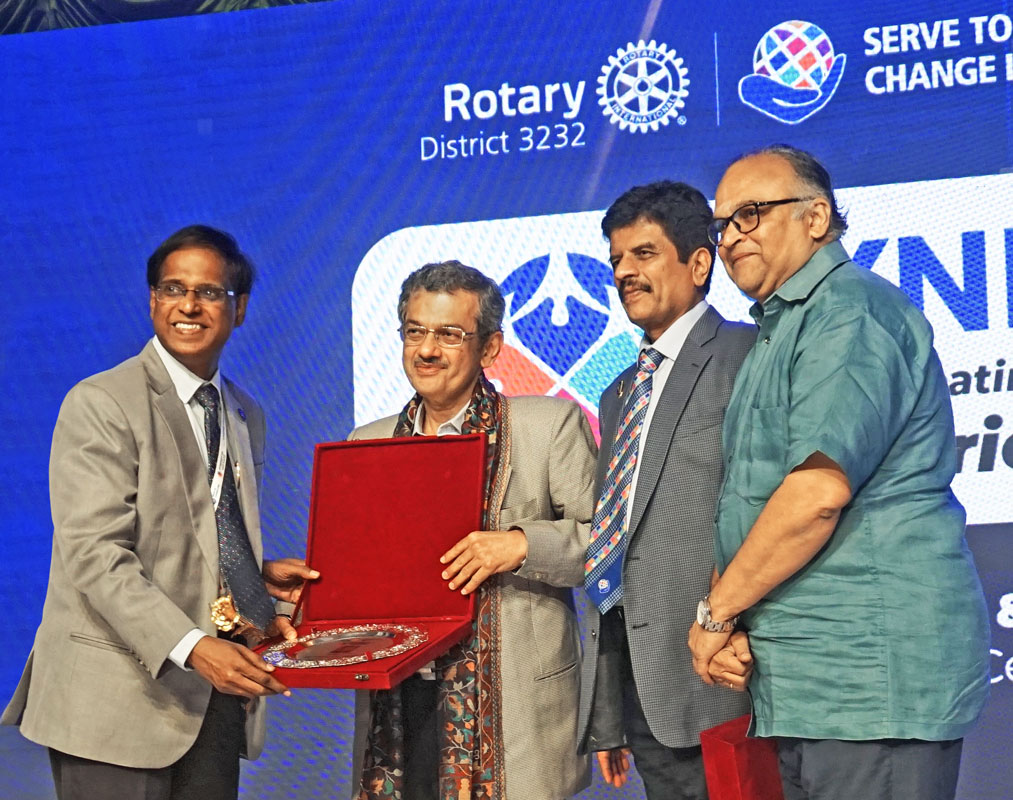
Empathy and ability to create strength, power of conviction, a process of constant learning and unlearning, and always trying to succeed in out-of-your-comfort zones workplace were qualities that four successful women leaders put forth in a panel discussion moderated by RID A S Venkatesh at RID 3232 district conference titled Synergy ’22.
Addressing the session named ‘Inspirational women leadership — the new horizon,’ he said right from the Black Lives Matter movement in the US which later spread to other countries with different dimensions, “the DEI bug has come to the front burner with organisations adopting this principle to embrace change. Our 117-year-old Rotary will have its first female president in Jennifer Jones from July 1, and she will be supported by her vice-president RID Nicki Scott. The DEI Task Force in RI is now looking into racial, gender, skill and age diversity to strengthen the organisation and prepare for future challenges, he said. In 2021–22, the RI Board had nine women out of 19 members.
Here is a synopsis of what the women panellists said:
Ponni Concessao, architect: Though I got an admit card to join NIT, Tiruchi, the principal refused admission just because I was a woman. I threatened him with dire consequences; including a legal suit, as I knew my case was very strong and even the Indian Constitution would back me. I was the only female among the 3,000 male students in that batch.
When I landed in Cornell University, New York, I was the first Indian woman to join that institution. Later on, it was not easy to convince men to give me business orders for my entreprise. Unlike in law, medicine or other professions, in the construction business there is what is called the ‘likeability factor’. An ambitious woman is not liked in this industry, whereas there are no such limitations for men.
Jaya Vaidyanathan, CEO, BCT Digital: I was 10 years junior to Ponni at the Cornell. In the1990s, when I declared that I wanted to have children, my colleagues, investment bankers, said it was a career suicide. It is important for women to be accepted in the workplace, and liked in your profession. More women taking up work will definitely push up the country’s GDP.

The stark reality is that only 10 per cent of Lok Sabha and Rajya Sabha members are women, though women represent over half the population. We need 50 per cent reservation in legislatures for a good political representation, though I am against the quota system. Women are better at multitasking than men.
Pratibha Batchu, head, Bosch Service Solutions, India: There are still unconscious, subtle biases against women in the workplace as social conditioning is difficult to break. My three-month training in Germany was tough as there were no women software engineers there many years ago. When I began my career, it was just a 150-member team, but now we have large teams of over 27,000 workforce across the world for product development. Right attitudes matter a lot while climbing the hierarchy, and we should be ready to unlearn quickly for steady growth.
Prabha Srinivasan, CEO, Ventura Paranas: When I joined my company, men were not ready to work under a woman CEO. But we moved on, and now 40 per cent of our staff is women. We have a natural talent for parenting as our biological system plays a great role in shaping our future.
Addressing the conference, TRF Trustee Bharat Pandya said Rotarians should remember that success is always accompanied by hard work, and be smart enough to achieve their goals. “You should focus on Grow Rotary initiatives, not just in membership, which is at the heart of Rotary, but also on building public image, supporting TRF, engaging new members and taking up big impactful service projects,” he said.
Over the last two years, the Covid pandemic has spread darkness and despair everywhere. “You flip the pages of newspapers, and they are full of grim news. This includes the Russia-Ukraine war, terrorism and starvation. But the commitment of Rotarians amid the dark times is unwavering.” Coming out with a simple formula he termed ‘PhD’, Pandya said, “passion to do good in the world, hunger to excel in service projects and discipline in paying attention to minute details to keep doing the right things again and again despite heavy odds, will see through Rotary in difficult times.”
When the 14-year-old Romanian gymnast Nadia Comaneci was asked the secret of her success after winning the gold in Montreal Olympics, 1976, scoring the perfect 10 out of 10, she said it in two words: practice and discipline.
On membership growth, he suggested Rotarians keep asking their spouse, relatives and friends, and put into action the call given by RI President Shekhar Mehta through the Each One, Bring One mantra. More important is to engage and involve the new members to retain them, he said.
Pandya added that voluntary donations from Rotarians to TRF are critical to drive the global programmes and projects through the Annual Fund. “Our Foundation is the backbone of Rotary as it allocates funds for global projects to provide shelter to the homeless, medical care, water and sanitation and education.” Rotary ensures a high degree of financial stewardship and transparency for its global grant projects, he said, as “92 per cent of all funds received are spent on service projects. TRF funds are spent effectively, wisely and in complete transparency.”
If all the Rotarians keep investing in TRF, “we can ensure a bright future with a great life for our children and grandchildren. The Foundation enjoys a legacy of goodwill. In 2006–07, when I was the governor of then RID 3140, our TRF giving was $2 million, topping the world, and this was made possible with a donation of $1 million by Rtn Harshad Mehta. That was 16 years ago.”
Pictures by V Muthukumaran





